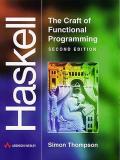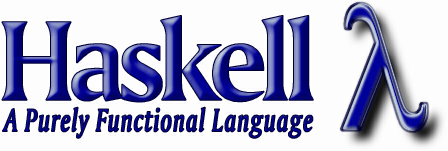Haskell(ID:1555/has002)
(named for the logician Haskell B. Curry). April 1990.
Designed by a committee from the functional programming community. A lazy purely functional language largely derived from Miranda. Static polymorphic typing, higher-order functions, user-defined algebraic data types, and pattern-matching list comprehensions. Innovations include a class system, operator overloading, functional I/O system, functional arrays, and separate compilation.
purely functional programming language. Computation proceeds by replacing expressions with their values. While all languages incorporate functions to some degree, HASKELL programs are composed solely of functions. It's based on Lambda calculus, hence the L used as a logo. The language is named for logician Haskell B. Curry, whose work provided much of the logical basis for the language. Yale has been an integral part of the development and implementation of the HASKELL language since it's inception, Yale has helped write the HASKELL Report, Wrote a tutorial, and most recently Paul Hudak has published a textbook on using HASKELL, "The Haskell School of Expression".
Today, the focus of the Yale group is on putting HASKELL to work in the real world by : using HASKELL to construct a variety of DSL's (Domain-Specific Embedded Languages). The challenges include
1) the semantic underpinnings of DSL's,
2) building blocks for DSL construction,
3) Domain-specific analysis and transformation,
4)compiling DSL's,
5) deploying DSL technology.
Places
Structures:
Related languages
| Miranda | => | Haskell | Based on | |
| T | => | Haskell | Co-development | |
| Haskell | => | Brisk | Augmentation of | |
| Haskell | => | Cayenne | Enhancement of | |
| Haskell | => | CPL | embedded in | |
| Haskell | => | Eden | Extension of | |
| Haskell | => | Escher | Incorporated some features of | |
| Haskell | => | Generic Haskell | Extension of | |
| Haskell | => | Gofer | Influence | |
| Haskell | => | GUM | Implementation | |
| Haskell | => | Haskell B | Implementation | |
| Haskell | => | Haskell# | Extension of | |
| Haskell | => | HUGS | Implementation | |
| Haskell | => | O'Haskell | Augmentation of | |
| Haskell | => | Yale Haskell | Implementation |
Samples:
References:
in SIGPLAN Notices 27(05) May 1992 Special Issue on the Functional Programming Language Haskell view details
in SIGPLAN Notices 27(05) May 1992 Special Issue on the Functional Programming Language Haskell view details
in SIGPLAN Notices 27(05) May 1992 Special Issue on the Functional Programming Language Haskell view details
in LISP and Symbolic Computation, 8(4) 1995 view details
in [ACM] ACM Computing Surveys (CSUR) 30(2) June 1998 view details

in [ACM] ACM Computing Surveys (CSUR) 30(2) June 1998 view details
in 2nd Scottish Functional Programming Workshop, St. Andrews 2000, Intellect, 2001 view details
Resources
Haskell home pageexternal link- logo
